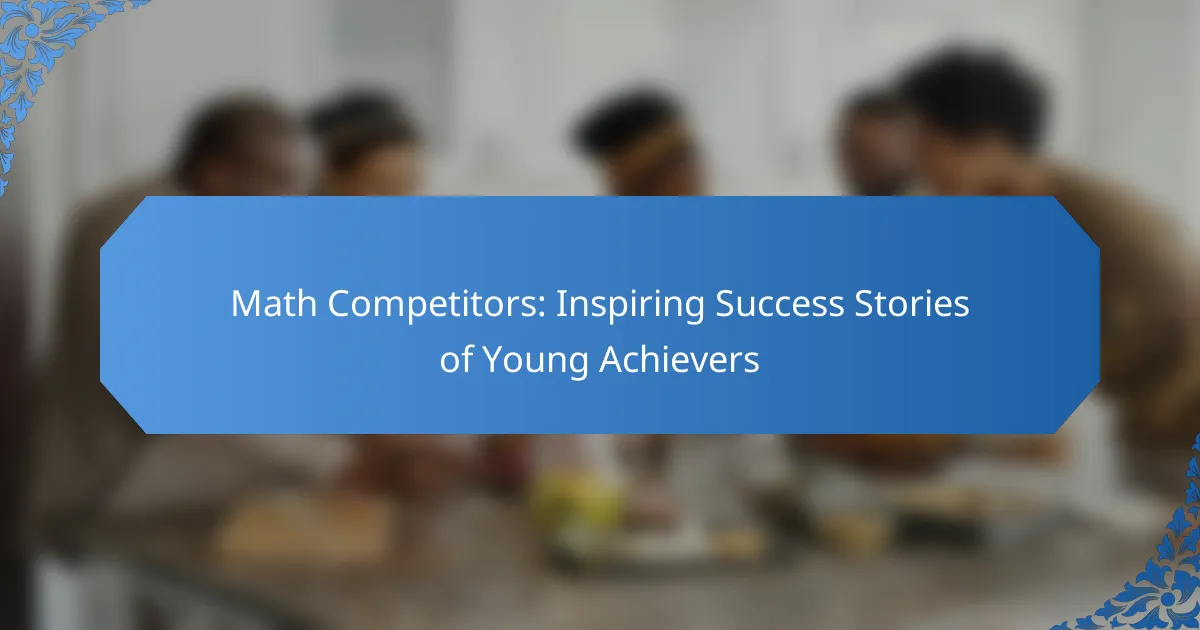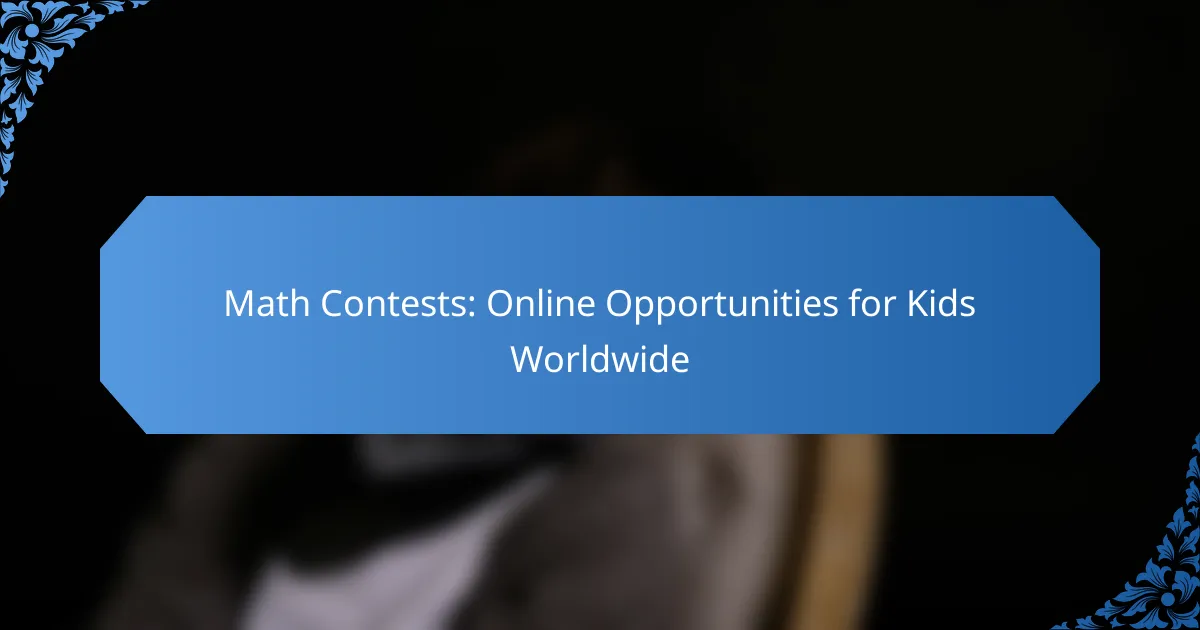Math competitions provide children with valuable opportunities to enhance their cognitive abilities and personal growth. By engaging in these events, participants develop critical skills such as problem-solving, resilience, and time management, which are essential for both academic success and social interactions.

What Are the Benefits of Math Competitions for Children?
Math competitions offer numerous advantages for children, enhancing their cognitive abilities and personal development. Participating in these events fosters essential skills that are beneficial both academically and socially.
Enhanced problem-solving skills
Math competitions challenge children to tackle complex problems, encouraging them to think critically and creatively. These challenges often require innovative approaches, helping students to develop a robust problem-solving toolkit.
For example, children may encounter puzzles that require them to apply various mathematical concepts in novel ways. This practice not only sharpens their analytical skills but also prepares them for real-world situations where problem-solving is crucial.
Improved critical thinking
Engaging in math competitions cultivates critical thinking by pushing children to evaluate multiple solutions and strategies. As they analyze problems, they learn to assess the effectiveness of different approaches, enhancing their decision-making abilities.
Competitions often involve time constraints, which further hones their ability to think quickly and logically under pressure. This skill is invaluable in both academic settings and everyday life, where quick, sound judgments are often required.
Boosted confidence
Success in math competitions can significantly boost a child’s self-esteem and confidence. Overcoming challenging problems and achieving recognition for their efforts reinforces a positive self-image.
Moreover, the experience of competing, whether winning or losing, teaches resilience. Children learn to embrace challenges and view setbacks as opportunities for growth, which is essential for their overall development.
Increased collaboration
Many math competitions encourage teamwork, allowing children to collaborate with peers. Working in groups fosters communication skills and teaches them the value of sharing ideas and strategies.
Through collaboration, children can learn from one another, gaining diverse perspectives on problem-solving. This social interaction is vital for developing interpersonal skills that will benefit them in future academic and professional environments.
Exposure to advanced concepts
Math competitions often introduce children to advanced mathematical concepts that may not be covered in their regular curriculum. This exposure can ignite a passion for mathematics and inspire further study in the field.
For instance, topics like combinatorics or number theory can be intriguing and motivate students to explore mathematics beyond the classroom. This early engagement with advanced material can set the foundation for future academic pursuits in STEM fields.
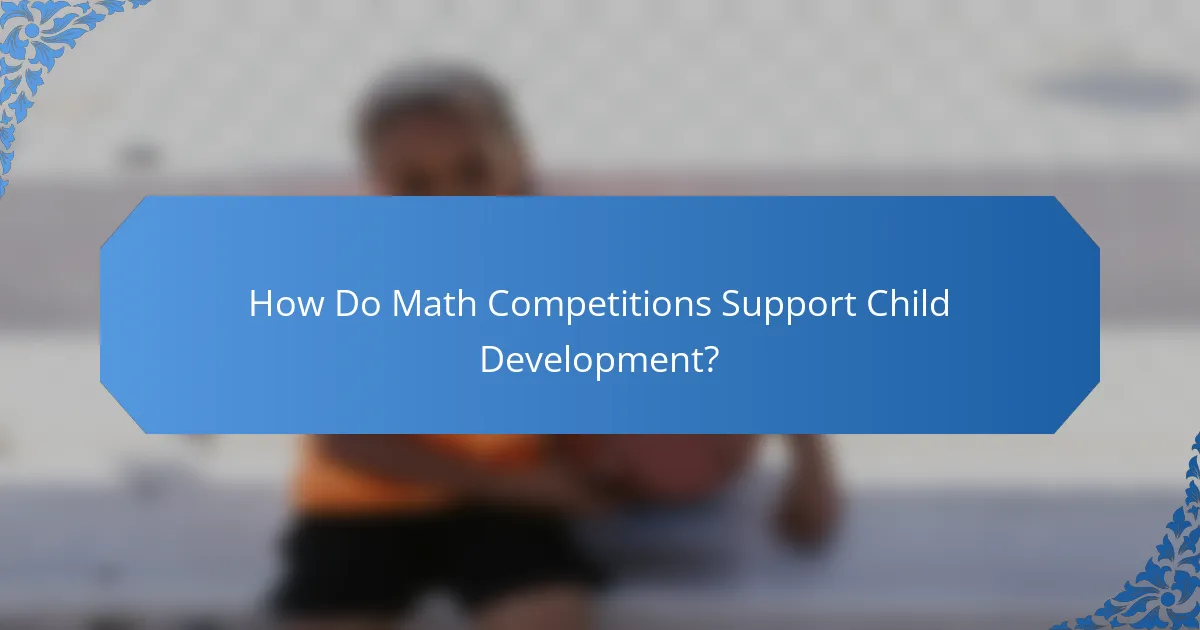
How Do Math Competitions Support Child Development?
Math competitions significantly enhance child development by fostering critical skills such as problem-solving, resilience, and time management. These events challenge children to think creatively and strategically, providing a platform for personal growth and academic improvement.
Fosters resilience
Participating in math competitions helps children build resilience by exposing them to challenging problems and the possibility of failure. When faced with difficult questions, they learn to persevere rather than give up, which is a valuable life skill.
For example, a child who struggles with a particular problem may initially feel discouraged. However, through practice and support, they can develop the ability to approach challenges with a positive mindset, understanding that setbacks are part of the learning process.
Encourages goal-setting
Math competitions encourage children to set specific, measurable goals, such as improving their scores or mastering particular topics. This practice of goal-setting helps them develop a sense of direction and purpose in their studies.
Children can start by setting small, achievable goals, like completing a certain number of practice problems each week. As they progress, they can gradually increase their targets, which fosters a sense of accomplishment and motivates them to aim higher.
Promotes time management
Competing in math contests requires effective time management skills, as participants must solve problems within a limited timeframe. This experience teaches children how to prioritize tasks and allocate their time wisely.
To improve time management, children can practice timed quizzes or set specific time limits for solving problems. This not only prepares them for competitions but also instills habits that are beneficial in academic and everyday life.
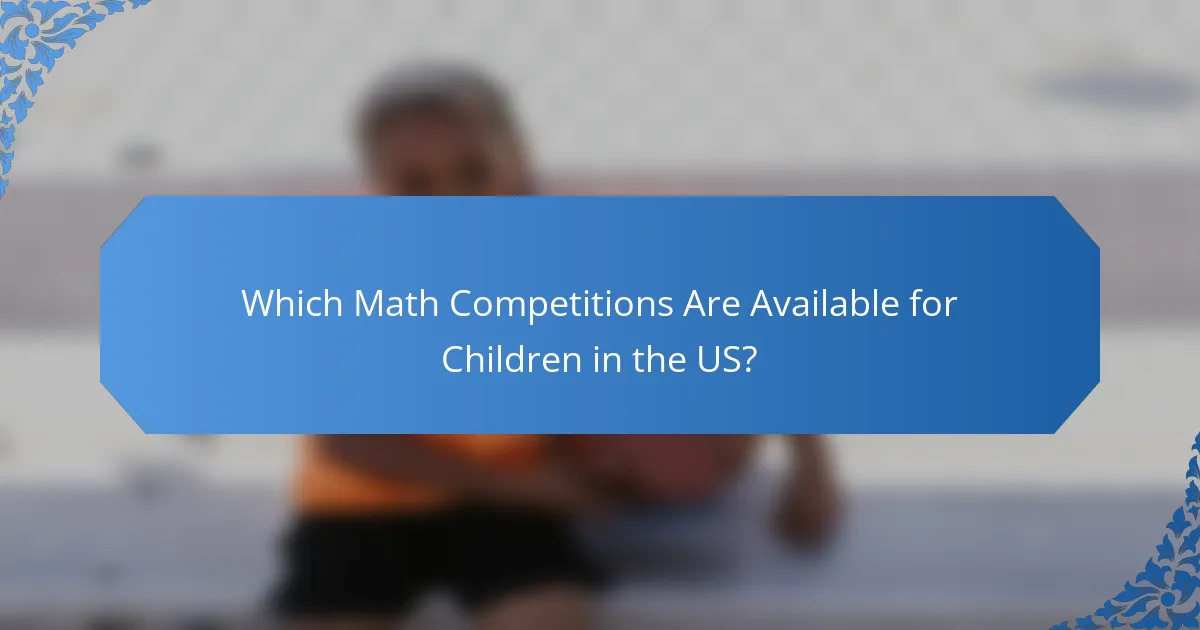
Which Math Competitions Are Available for Children in the US?
In the US, several math competitions cater to children, providing opportunities to enhance their problem-solving skills and mathematical understanding. Notable competitions include the Math Olympiad, MathCounts, and the American Mathematics Competitions, each offering unique formats and challenges.
Math Olympiad
The Math Olympiad is an international competition that encourages students to engage in mathematical problem-solving. Participants typically tackle a series of challenging problems over several months, culminating in a final competition. This program is designed for students in grades 4 through 8, promoting critical thinking and creativity.
To prepare, students can practice with past problems and participate in local training sessions. Schools often form teams, fostering collaboration and camaraderie among participants. Engaging in the Math Olympiad can significantly boost a child’s confidence and interest in mathematics.
MathCounts
MathCounts is a nationwide middle school mathematics competition that emphasizes teamwork and individual achievement. It consists of a series of rounds, including a written competition and a countdown round, where students solve problems under time constraints. This format helps develop quick thinking and effective problem-solving strategies.
Schools can form MathCounts teams, and local chapters often host competitions leading to state and national levels. Students benefit from the collaborative environment and can enhance their mathematical skills through practice and peer support. Participation in MathCounts can also lead to scholarships and recognition in the field of mathematics.
American Mathematics Competitions
The American Mathematics Competitions (AMC) are a series of examinations designed for students in grades 6 through 12. The AMC 8, AMC 10, and AMC 12 cater to different age groups, providing a progressive challenge. These competitions focus on problem-solving and critical thinking, with a variety of topics covered.
Students can prepare by reviewing past AMC problems and participating in study groups. The AMC serves as a gateway to further competitions, including the AIME and the USAMO, which can lead to prestigious opportunities. Engaging in the AMC can help students gauge their mathematical abilities and inspire further study in STEM fields.
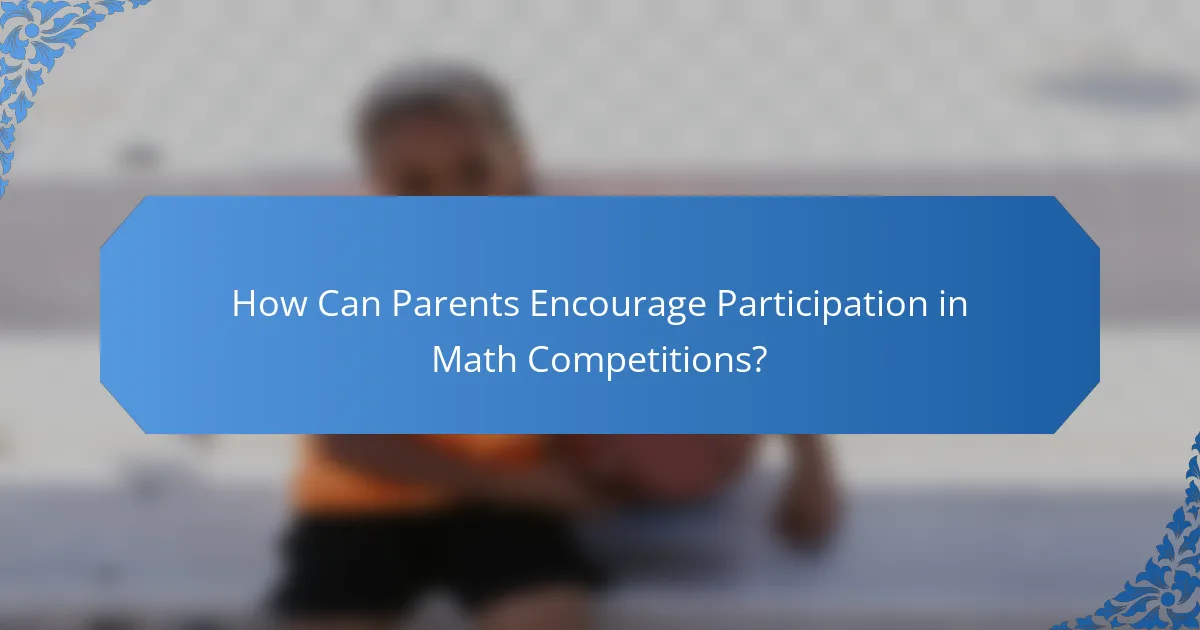
How Can Parents Encourage Participation in Math Competitions?
Parents can play a crucial role in encouraging their children to participate in math competitions by providing support, resources, and opportunities for practice. Engaging in these activities can enhance children’s problem-solving skills and boost their confidence in mathematics.
Provide resources and materials
To foster interest in math competitions, parents should supply their children with a variety of resources and materials. This can include books focused on problem-solving techniques, online platforms offering practice problems, and past competition papers for familiarization.
Investing in math games and puzzles can also make learning enjoyable. Look for resources that cater to different age groups and skill levels to ensure that the materials are both challenging and accessible.
Join local math clubs
Encouraging children to join local math clubs can provide them with a supportive community of peers who share similar interests. These clubs often organize practice sessions, competitions, and collaborative problem-solving activities that can enhance learning.
Parents should research available clubs in their area, considering factors such as the club’s focus, meeting frequency, and the qualifications of the mentors involved. Participation in these clubs can also help children develop teamwork and communication skills.
Attend workshops and training
Workshops and training sessions can significantly boost a child’s preparation for math competitions. These events often feature expert instructors who provide targeted coaching and strategies for tackling complex problems.
Parents should look for workshops that are age-appropriate and cover relevant topics. Many organizations offer weekend or summer camps dedicated to math competition preparation, which can be an excellent way for children to immerse themselves in the subject.
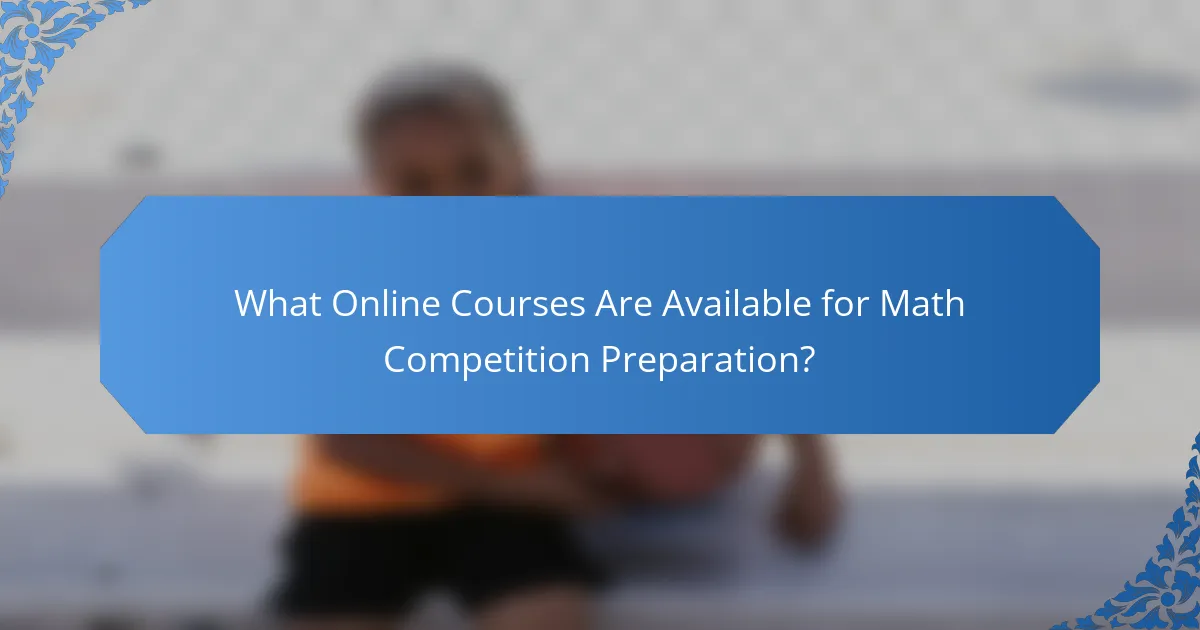
What Online Courses Are Available for Math Competition Preparation?
Numerous online courses are designed specifically for math competition preparation, catering to various skill levels and learning styles. These courses often focus on problem-solving techniques, advanced mathematical concepts, and competition strategies to help students excel.
Art of Problem Solving courses
The Art of Problem Solving (AoPS) offers a range of courses tailored for students preparing for math competitions. These classes cover topics such as algebra, geometry, and number theory, emphasizing problem-solving skills through challenging exercises and interactive discussions.
Students can choose from live online classes or self-paced courses, allowing flexibility in their learning. AoPS also provides a vibrant online community where learners can collaborate and share insights, enhancing their understanding of complex concepts.
Brilliant.org problem-solving classes
Brilliant.org features interactive problem-solving classes that engage students in hands-on learning. The platform focuses on critical thinking and real-world applications of mathematics, making it suitable for competition preparation.
Courses are structured to encourage exploration and experimentation, with a variety of topics available. Students can track their progress and tackle problems at their own pace, which is beneficial for mastering challenging material.
Mathletics online training
Mathletics provides an online training platform that combines curriculum-based learning with competitive practice. This resource is particularly useful for younger students, offering a gamified approach to math that motivates learners through rewards and challenges.
With a range of activities and assessments, Mathletics helps students build foundational skills while preparing for competitions. The platform allows for personalized learning paths, ensuring that each student can focus on areas where they need improvement.
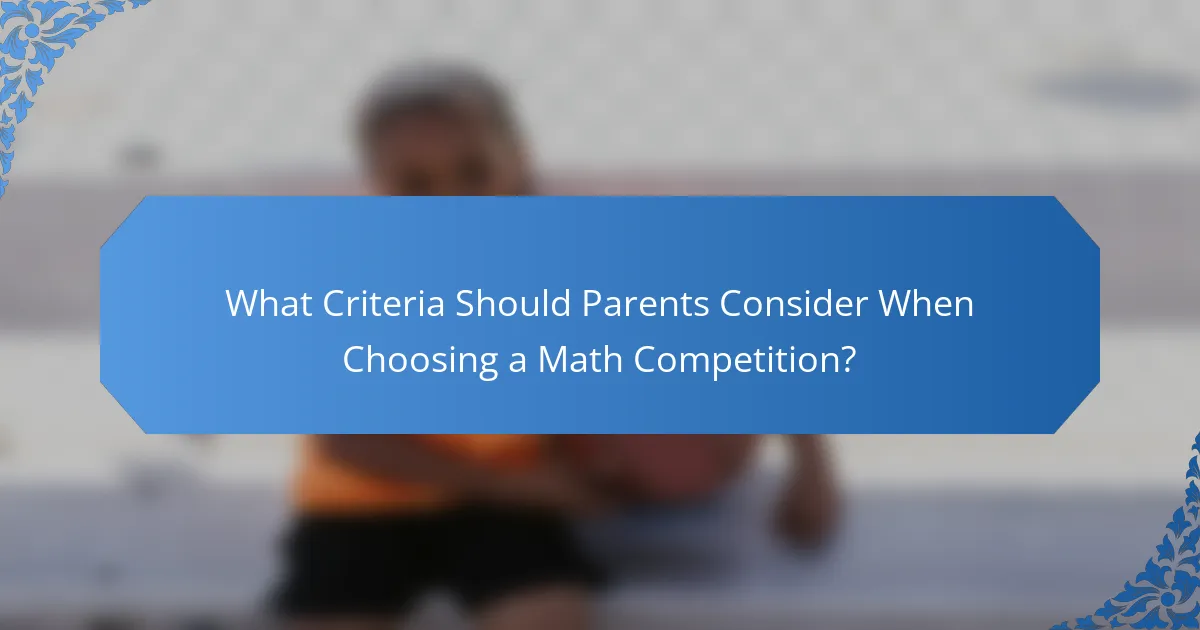
What Criteria Should Parents Consider When Choosing a Math Competition?
Parents should evaluate several key criteria when selecting a math competition for their children, including age appropriateness, skill level, and the competition’s format. These factors can significantly influence the child’s experience and development in mathematics.
Age appropriateness
Age appropriateness is crucial when choosing a math competition, as it ensures that the challenges presented are suitable for the child’s developmental stage. Competitions often have specific age categories, which can range from elementary to high school levels.
For younger children, look for competitions that focus on basic problem-solving and fun, engaging formats. For instance, competitions designed for ages 8-12 might include puzzles and games, while those for teens could involve more complex algebra and geometry.
Parents should also consider the child’s maturity and confidence level. A competition that is too advanced may discourage a young participant, while one that is too easy might not stimulate their interest. Balancing challenge with ability is key to fostering a positive experience.


